What are the benefits of cold water swimming? How to start and how to stay safe in cold water
What are the benefits of cold water swimming and what do beginners need to know? We asked the experts


Parenting advice, hot topics, best buys and family finance tips delivered straight to your inbox.
You are now subscribed
Your newsletter sign-up was successful
Interested in taking a chilly dip? Here's everything you need to know about the benefits of cold water swimming and how to do it safely before you take the plunge.
Cold water swimming became an unlikely saviour for many in the Covid-19 pandemic, providing a much-needed outlet to folks across the UK amid the repeated closures of gyms, leisure centres, and public pools. Participation in cold water swimming in natural bodies of water, otherwise known as ‘wild swimming', has increased by between 1.5 and 3 times since 2019, according to a trends report by Outdoor Swimmer.
The magazine also found that 52% of people said they had enjoyed the pastime more than they had anticipated, while 47% liked it just as much as they’d expected. This surge in popularity is reflected in consumer trends, with leading triathlon brands like Zone3 seeing a triple-figure growth in the sales of their neoprene swimwear accessories between 2020 and 2021.
From boosting your mood to reducing inflammation, a dip in cold water is sopping with physical and mental health benefits - and it turns out that being cold does burn calories too. From what to expect on your debut swim and the health benefits of cold water swimming to staying safe in the water, we’ve covered everything you need to know before you strip off for your first icy dip with advice from the experts.
What are the physical health benefits of cold water swimming?
Swimming in cold water has been associated with targeting inflammation and thus reducing the symptoms of a wide range of conditions, including migraine, arthritis, Type 2 diabetes, and many types of depression.
With the human body’s natural temperature resting at an average of 37˚C, plunging into frigid waters is never going to feel comfortable. But for many, this initial 'ouch' is a small price to pay for the bounty of health benefits of cold water swimming.
"Inflammation is affected in two ways – one is a long-term effect, which is this adaptation to cold, your cold stress response is reduced as you get used to it, and that means that your stress response to other stresses is also reduced," Dr. Mark Harper, consultant anaesthetist and author of Chill: The Cold Water Swim Cure, explains.
Parenting advice, hot topics, best buys and family finance tips delivered straight to your inbox.
There’s also research to suggest that cold water swimming could lead to higher immunities, with one study finding that cold water immersion may help to temporarily boost your white blood cell count – the body’s personal army against infection.
What are the mental benefits of cold water swimming?
After the shock of entering cold water wears off, many people report feeling an overwhelming sense of calm as their body adjusts to its new environment. The chilly temperatures force one to concentrate and control their breathing, similarly to how they would in traditional meditation.
And after this scrumptious bite of relaxation comes its even more delicious aftertaste – the euphoria. Cold water immersion has been proven to increase the brain's 'happy hormones', leaving the swimmer on a natural high that can last several hours. The great news is that even just one to two minutes in the water will do the trick.
"All these chemicals are being released [when you enter cold water] – adrenaline, noradrenaline. That’s what gives you the buzz," explains Dr. Harper.
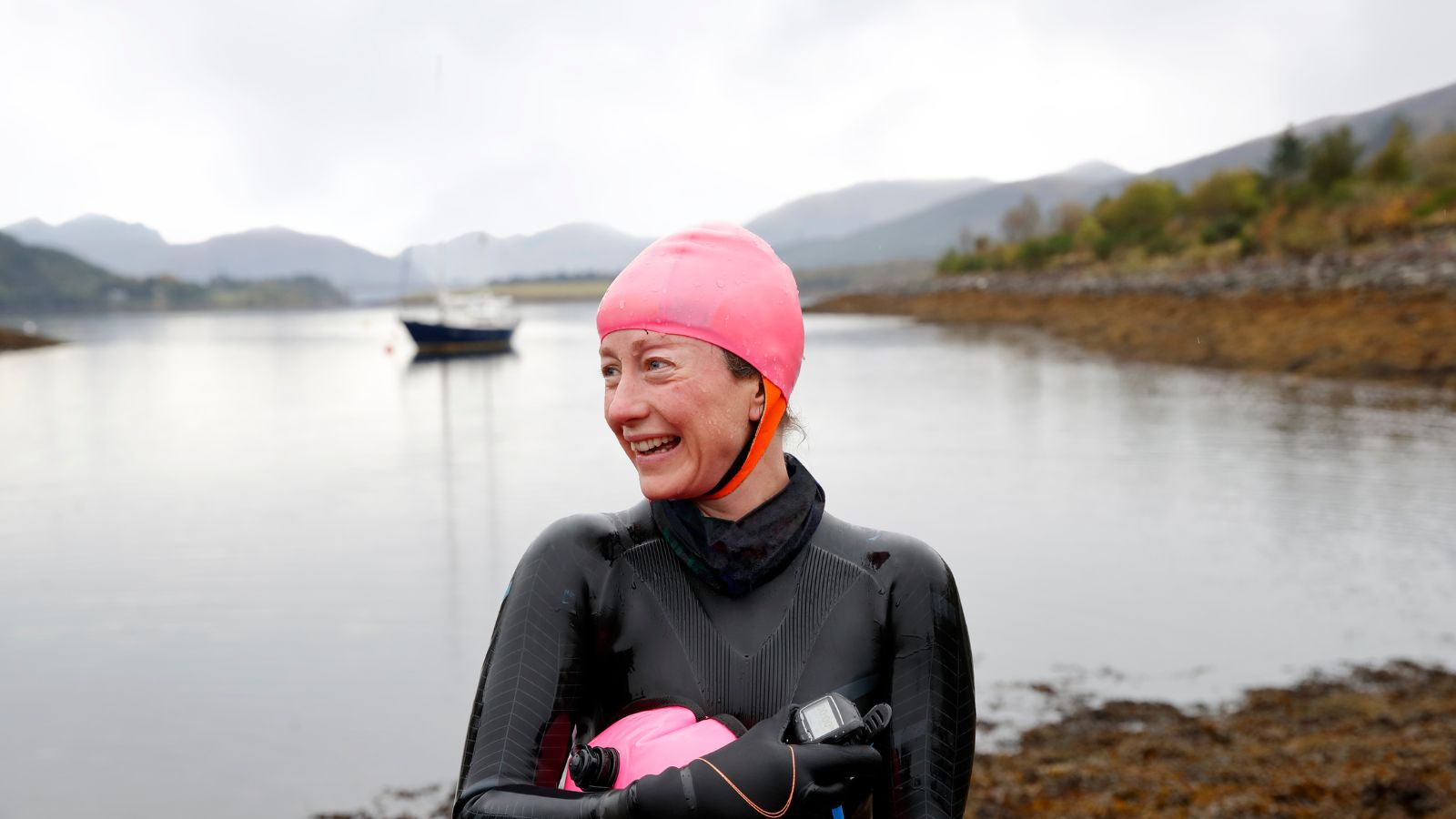
This ‘buzz’ is so potent that many cold water swimmers compare the experience to taking stimulant drugs – without the nasty comedown or risk of addiction. "It’s like cocaine," says Dr. Harper. "The crucial difference is, it's the body using its own store so it has control over the situation."
If you want to really reap these benefits, there are a couple of easy things you can do. While it’s not necessary to dunk your entire head under the water, getting your face wet is a surefire way to enhance the high. Splashing your face with cold water activates the vagus nerve, which runs from the brain through the face and into the abdomen.
"This directly stimulates the parasympathetic nervous system – the rest, digest system – that will directly reduce inflammation," Dr. Harper explains.
What to expect from your first cold water swim
If you’re new to cold water swimming, it’s important to mentally prepare yourself for the inevitable 'Oh My Gosh' that you’re like to gasp – or splutter – upon taking that initial plunge.
Cold water shock, otherwise known as a cold water stress response, refers to the body’s automatic response to being submerged in waters 15 degrees and below. Symptoms include uncontrolled breathing, hyperventilating, a racing heart rate, and even muscle spasms. These intense reflexes, which are caused by the sudden constriction of blood vessels in response to the skin’s cooling, occur within the first minute of exposure to cold water and are typically more pronounced in people who are less acclimatised to low temperatures.
"Like with any shock, the sympathetic nervous system activates the fight or flight response," Dr Harper adds. "The adrenaline makes your heart beat and your blood pressure go up."
Ironically, what feels like your body attacking itself is actually a protective technique. "The noradrenaline, [a chemical that functions in the brain as both a neurotransmitter and a hormone] is what squeezes all the blood vessels to your skin and shuts them down, so that all your heat stays in the core, rather than being given back to the water," Dr. Harper continues.
"Your organs work best in a very narrow temperature zone and so the body tries to make sure those that are vital to survival are maintained at this optimal level (36.5-37.5˚C)."
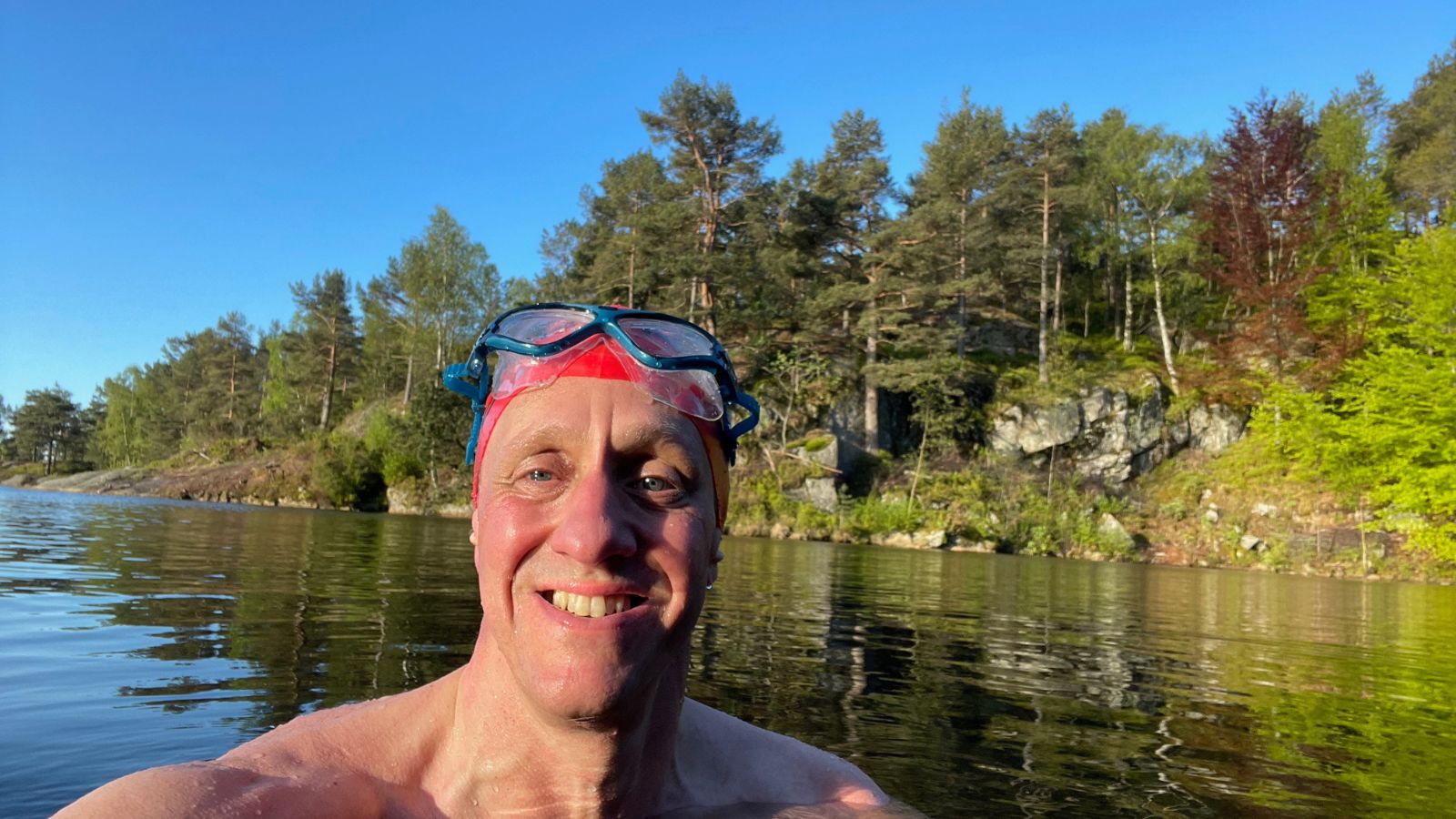
Dr. Mark Harper, author of Chill: The Cold Water Swim Cure
Why am I in so much pain when I enter cold water?
Your body may also feel physically pained when immersed in cold water, especially in temperatures below 10˚C.
If you wondering how an icy splash could elicit such a severe reaction (it’s just H2O, after all!), there are a few things to keep in mind.
Firstly, cold triggers the body’s pain receptors. The thermoreceptors that sensor cold are also higher in quantity than those that register warmth, which means our bodies are basically designed to ring alarm bells when subjected to lower temperatures.
The hands tend to receive the brunt of this agony, with their physiological makeup and exposed location on the body leaving them more vulnerable to the water’s bite. Some cold water swimmers may even experience 'claw hand', the term that describes a loss of fine motor control in the human hands after prolonged exposure to cold water.
"The hand is very sensitive to cold water," Dr. Harper warns. "It’s got lots of nerve receptors in them and it’s very superficial, being out on a limb, so it’s not as good at protecting itself."
That stinging numbness can also be blamed on the circulatory system of the hand, which functions in a different way from the rest of the body. "The palms of the hands have what’s called ‘glabrous skin’ which, basically, means it’s hairless and the blood vessels remain open even when all the other peripheral vessels are constricted," Dr. Harper explains. The soles of the feet also have this type of smooth skin surface that facilitates heat loss, which is why your toes are also the first to seize up during or after an icy dip.
Muscle spasms are another culprit of pain during cold water swimming, as the low temperatures cause the muscles to stiffen and cramp due to the overexcitement of nerves. Fortunately, the severity of this cold water shock is likely to subside with increased exposure.
"After about six times, your response will be a lot lower," Dr. Harper says. What’s particularly important is that the body’s reflexive gulp of air, which often leads people to inhale water and drown, is no longer so pronounced.
How to start cold water swimming as a beginner and how to stay safe
Now that you’ve been sold on the benefits of cold water swimming, it’s time for the exciting bit – actually doing it. Starting to swim in cold water can be daunting for anyone – including those who can swim proficiently – and like learning any new skill, is likely to come with its fair share of ups and downs (or ebbs and flows, if you will.)
It’s also crucial to remember the importance of safety when dealing with waters of low temperatures so that you can mitigate the risks of hypothermia and/or drowning.
It's not uncommon for swimmers to feel warm upon exiting very cold water, leaving some even itching for round two. It's highly advised you resist this urge, however, as it's unlikely to do you any favours in the long run and could put you at greater risk of hypothermia.
"Don't overdo it," warns Dr. Harper. "If you’re out and you want to get back in, you’ve done it just right. You won’t get any bigger high, because your body has limits to how much of these endorphins and substances can be released."
1. Join an open water swimming community
If you’re a total beginner to cold water swimming, the first port of call is to find a community that can help teach you the ropes. Not only is this an excellent way to meet new people and find suitable spots to swim, but it’s also crucial to maximizing your safety in and out of the water.
"Beginners should always swim with others and if they are swimming in a location that is new to them, it is key to go with someone that knows the entry and exit points especially," says Sue Wilson, Zone3 ambassador and qualified Open Water swim coach.
"The Outdoor Swimming Society Facebook Page and local outdoor/open water clubs are great places to start. They will be familiar with locations and will have a good understanding of any currents or features to be aware of when taking to the water."
2. Invest in quality kit
Investing in high-quality kit for cold water swimming can be a game changer, making the experience more pleasurable (or at least less painful) without diluting that post-dip high.
It’s up to you whether you wear a wetsuit or your trusty swimming costume, but experts agree that you should protect your extremities as much as possible in cold water.
To avoid that dreaded 'claw hand', thermal waterproof gloves are an absolute must. We had success with the Zone3 Neoprene Heat Tech Gloves, which boast unapologetic insulation and clever technology to customise the fit. (They also work great if you want to keep your fingers toasty on an outdoor run or cycle, making them a lovely multi-functional purchase). Their counterpart socks, which have the same hook and loop fastening for optimal sizing, are equally effective in sealing in the heat.
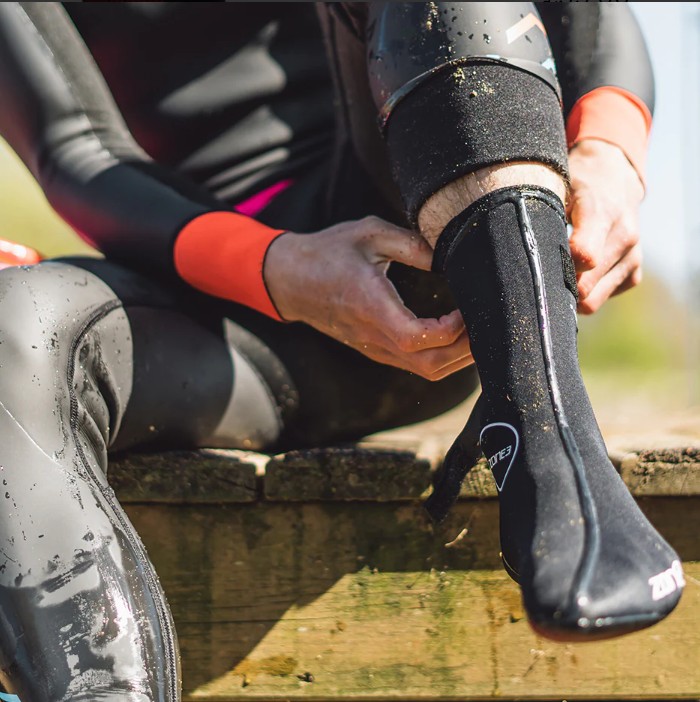
Zone3 Neoprene Heat Tech Socks
Wearing a hat is also crucial to keeping warm, Dr. Harper advises. "You lose a lot of heat from the head," he warns. "It's quite thin that layer between the skull and the brain."
Go with a beanie or bobble hat, or if you really want to fend off the elements, the fleecy Zone3 Neoprene Heat Tech swim hat won't disappoint.
As for your after-swim attire, the snugger and heavier, the better. The Zone3 Polar Fleece Parka Robe is an excellent choice to keep shivers at bay, promising instant warmth and coziness from the moment you slide into it.
The Red Original Evo Parka is another safe bet if warmth is what you're after. Made with 100% recycled fabric, this plush robe is both waterproof and super soft – the perfect marriage for any post-swim garment. It also features hands-free changing, so you won't have to waste any time searching for shelter to get back into your warm clothes.
If you're looking for something to get you from wet to dry quickly in the summer months, go with the Compact Robe by Lifeventure. Lightweight yet roomy, this nifty piece allows you to redress in total privacy and dries 8x more quickly than a standard towel. A sturdy thermal flask to keep your drink hot, like the leak-proof Primus Klunken Vacuum, is also a good shout.
3. Enter the water slowly
While it might be tempting to 'get it over with' by diving or jumping in, it’s always recommended that people approach cold water cautiously.
"Swimmers entering cold water should always enter slowly and gradually," Wilson advises. "Splash yourself with water, slowly progress deeper, and feel your way forward. Remember to breathe, maintain control and relaxed.
"Jumping in can not only cause shock and panic and in some cases, swimmers may not know how deep the water is or what is beneath the surface that could cause injury."
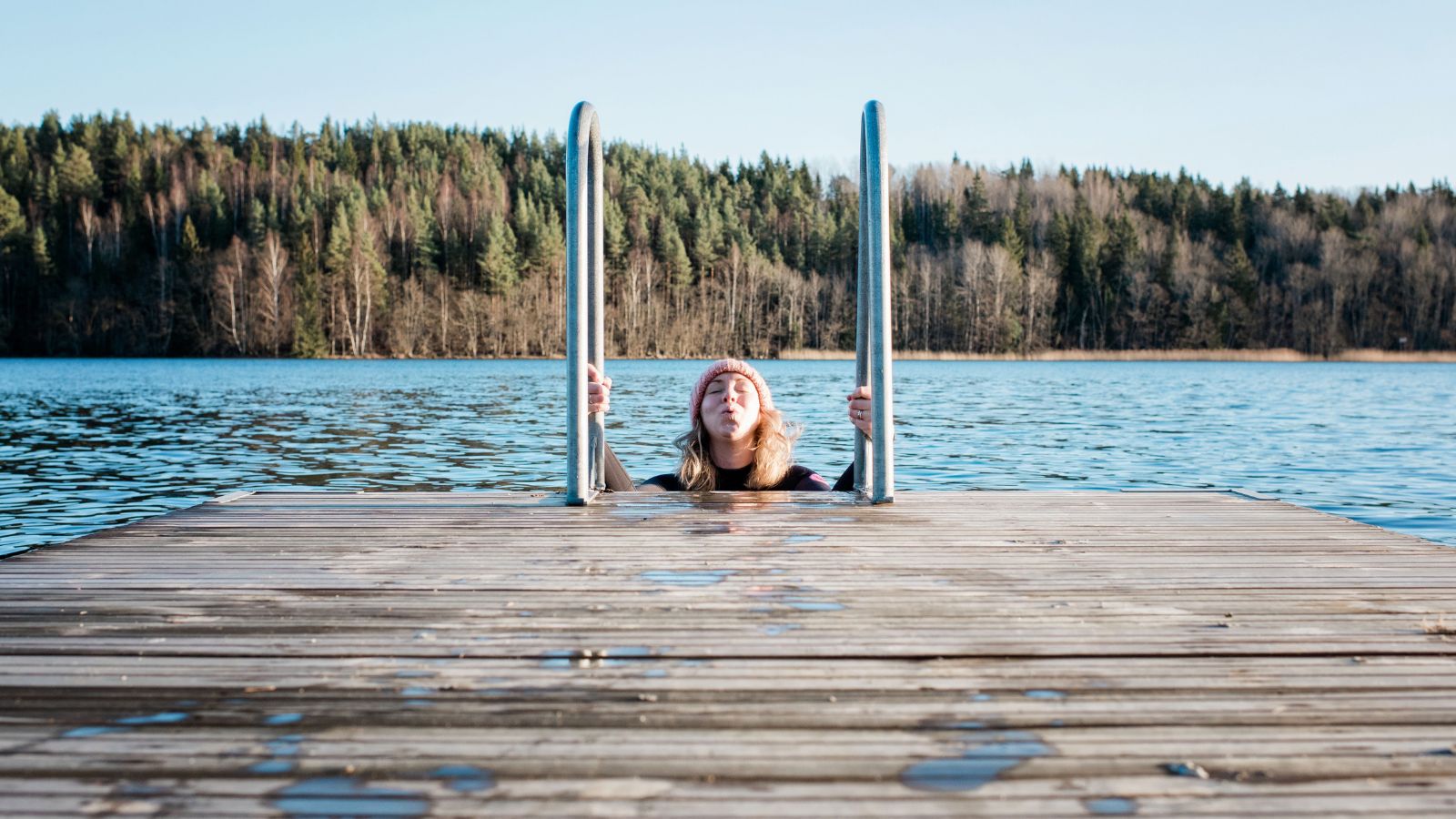
4. Skip the front crawl
You may be a bullet in your local pool with your streamlined front crawl, but when it comes to cold water, it’s best to rein in the speed.
Public pool temperatures are significantly higher than those of natural bodies of water, with most being heated at between 26˚C and 28˚C to allow swimmers to train for extended periods of time without the risk of hypothermia.
The average sea temperature of the British Isles in the winter months, on the other hand, hovers in the far chillier range of between 6˚C and 10˚C.
Inland waters tend to have even more extreme conditions, with temperatures dropping to as low as zero at certain times of the year. Meanwhile, summer temperatures of the sea rarely exceed 20C, which means that, no matter what the season, you’ll likely find it difficult to replicate your pool sessions.
To avoid tiring yourself out and/or swimming too far out, breaststroke, a.k.a. 'frog stroke', is your best option.
"Breaststroke is very helpful for seeing where you are going and ensuring that swimmers don’t stray too far away from the edge," Wilson says. "Breaststroke is also helpful for maintaining regular breathing, blowing bubbles on the surface can be useful to maintain focus on breathing."
5. Pay attention to your body
When it comes to cold-water swimming, there’s no one-size fits all approach. What works for one person may not apply to another, so it's important that you pay attention to your own body and stay within your limits.
Unfortunately, certain myths about cold water swimming have gained traction in recent years that have directly jeopardised the safety of newbies to the pastime.
One popular snippet you may have heard is the 'One minute per degree' rule, which argues that the temperature of the water should directly reflect the number of minutes you stay in it. So for example, if the water is 5˚C, you can safely stay in it for five minutes, and if it’s 30˚C, then half an hour's your goal. Not only is this claim completely unsubstantiated, but it can also be extremely dangerous to the safety and well-being of the swimmer.
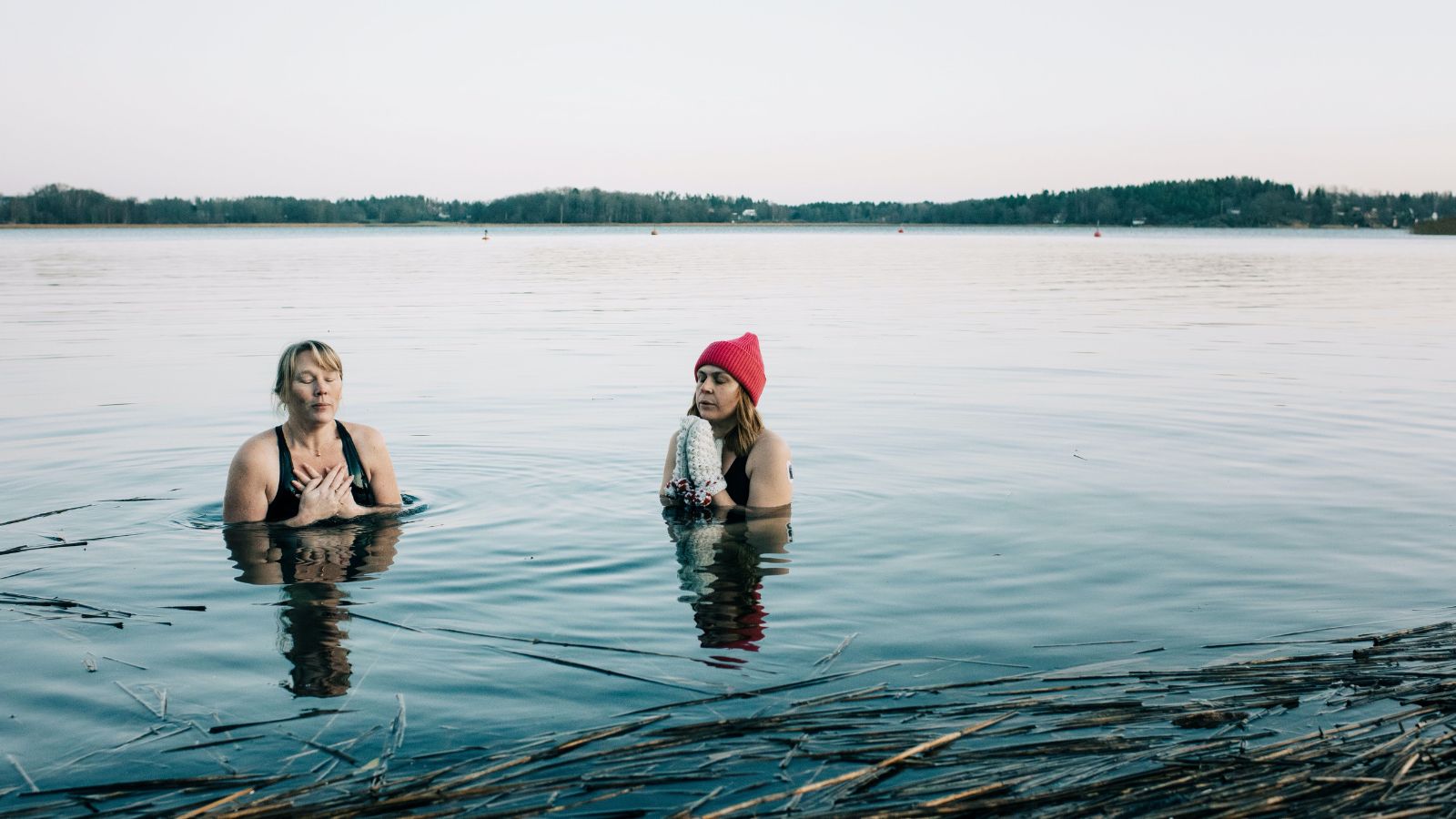
"Anything that has a definite time to it, whether it’s one minute per degree, or 11 minutes optimal time, is wrong," Dr. Harper says. "That is the biggest myth that needs to be kicked off."
Wilson agrees, arguing that tolerance varies from person to person. "Important factors to consider are; water and air temperature, nutrition, overall tiredness, time of day, are you well hydrated, and your current mental health."
6. Warm up quickly after getting out of cold water
If there’s a time to act fast in your cold water swimming adventure, it’s now. Once you’re back on dry land, it’s crucial that you warm up as quickly as possible. "If you are a bit chilly getting out of the water (not hypothermic), getting dressed with lots of layers as soon as possible is key to ensuring your body temperature doesn’t get too cold once you have left the water," says Wilson.
"It is easy to get caught up in conversations with other swimmers but prioritising getting warm then having a chat is important. Once dressed, move around, jump around, sip a warm drink and have some food."

Emma is a Lifestyle News Writer for Goodto. Hailing from the lovely city of Dublin, she mainly covers the Royal Family and the entertainment world, as well as the occasional health and wellness feature. Always up for a good conversation, she has a passion for interviewing everyone from A-list celebrities to the local GP - or just about anyone who will chat to her, really.